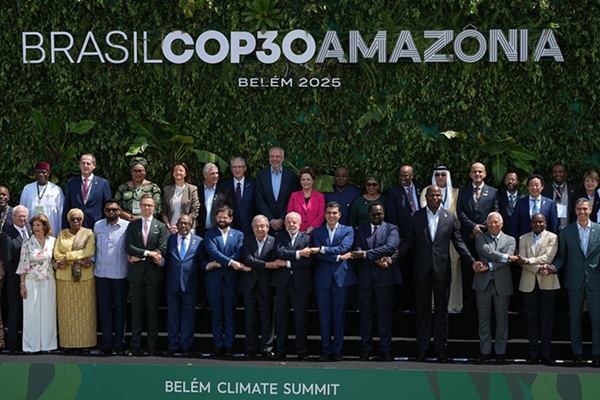Prelims: (Environment + CA)
Mains: (GS-2 – International Relations; GS-3 – Environment) |
Why in the News ?
The 30th UN Climate Conference (COP30) held in Belém, Brazil, concluded with the adoption of the Global Mutirão Agreement, which calls upon nations to develop two major roadmaps:
- A roadmap to halt and reverse global deforestation, and
- A roadmap to “transition away” from fossil fuels.
While the forest roadmap received broad support, binding commitments on fossil fuel phase-out were avoided, reflecting deep geopolitical divisions and divergent development priorities.

COP30: Major Outcomes, Divisive Issues & Power Shifts
Roadmap Focused on Ending Deforestation
A Central Political Priority
The most prominent outcome was the announcement of a dedicated global roadmap to end deforestation, to be developed by countries over the next year.
Key Elements of the Roadmap
The deforestation roadmap is expected to mobilise:
- Additional and long-term finance for forest conservation
- Cross-border cooperation to control illegal logging
- Restoration strategies for degraded landscapes
- Support mechanisms for forest-dependent and indigenous communities
Contextual Importance
Given that COP30 was hosted in the Amazon biome, the world’s largest rainforest, the emphasis on forest protection carried strong symbolic and strategic weight. Brazil highlighted forests as core to:
- Climate mitigation
- Biodiversity protection
- Indigenous rights
- Sustainable development
Fossil Fuels: The Most Contentious Debate at COP30
Demands for a Global Phase-Out
- Over 80 nations, including the EU and island states, pushed for explicit language requiring a fossil fuel phase-out.
- They sought a timeline, quantified goals, and binding commitments.
Opposition from Developing Economies
Countries such as India, China, Russia, South Africa, and Saudi Arabia opposed mandatory phase-out language, arguing that:
- Energy transitions must account for domestic development needs
- Climate finance remains inadequate and uncertain
- Uniform global timelines are unfair and unrealistic
India and other BRICS nations insisted on the principle of nationally determined energy pathways.
Outcome: A Non-Binding Compromise
COP30 ultimately adopted:
- A general commitment to “transition away from fossil fuels”
- No deadlines
- No mandatory reduction trajectory
- A separate voluntary roadmap, announced by the COP Presidency
This outcome reflects significant negotiation influence from developing countries.
The Emerging Power Shift in Climate Diplomacy
Absence of the United States
For the first time in 30 years, the United States had no official delegation at a COP.
This absence altered the balance of power and reduced the leverage of developed nations.
Rise of the BRICS Bloc
In the absence of the U.S., BRICS countries played a decisive role by shaping:
- Removal of fossil phase-out language
- Insertion of flexibility for developing nations
- Greater focus on climate equity
- Debate around trade-related climate measures (e.g., EU's CBAM)
COP30 marked a transition toward a multipolar climate negotiation structure.
Climate Finance: The Central Fault Line
Two-Year Climate Finance Work Programme
Countries agreed to a structured two-year effort to:
- Assess global climate finance needs
- Improve transparency of funds
- Develop mechanisms for predictable and adequate flows
Adaptation Finance
COP30 acknowledged severe funding gaps and called for:
- Tripling global adaptation finance by 2035
- Prioritising vulnerable and developing countries
Reaffirmation of Paris Agreement Article 9.1
A major achievement for developing nations was the reaffirmation that:
- Developed countries have a mandatory obligation to provide climate finance
- Contributions cannot be voluntary or arbitrarily determined
This was a strong diplomatic victory for the Global South.
Other Agreements Under the Global Mutirão
COP30 also approved 10 thematic agreements, including:
- Technology transfer mechanisms
- Loss and damage financing frameworks
- Strengthening the Global Goal on Adaptation
- Just energy transition and livelihood protection pathways
- Enhanced transparency and implementation guidelines
These agreements will feed into the agenda for COP31.
Significance of COP30
A Shift Toward Equitable Climate Politics
COP30 rebalanced the negotiation space, strengthening the role and voice of developing nations.
A Realistic but Incremental Approach
Instead of ambitious, politically unfeasible declarations, COP30 delivered a pragmatic agreement rooted in equity and national circumstances.
Centrality of Forests in Climate Action
By placing deforestation at the core of global climate policy, COP30 advanced a critical pillar of climate mitigation.
Fossil Fuel Divide Highlighted
The inability to agree on timelines for phase-out indicates that future COPs will continue to be dominated by energy transition debates.
|
FAQs
1. What is the Global Mutirão Agreement?
A political agreement adopted at COP30 that mandates countries to prepare roadmaps on deforestation and fossil fuel transition.
2. Why was fossil fuel phase-out not adopted?
Due to opposition from major developing economies citing development needs and insufficient climate finance.
3. What is the purpose of the deforestation roadmap?
To halt and reverse global deforestation through finance, cooperation, restoration, and community support.
4. Why was the U.S. absence at COP30 significant?
It shifted negotiating power, allowing developing countries and BRICS to shape outcomes more decisively.
5. What is the major win for developing countries?
Reaffirmation that developed nations have a mandatory obligation to provide climate finance under Article 9.1.
|

 Contact Us
Contact Us  New Batch : 9555124124/ 7428085757
New Batch : 9555124124/ 7428085757  Tech Support : 9555124124/ 7428085757
Tech Support : 9555124124/ 7428085757








